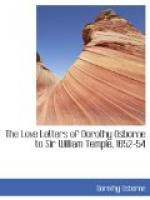Yrs.
Letter 14.—This letter contains the most interesting political reference of the whole series. Either Temple has written Dorothy an account of Cromwell’s dissolving the Long Parliament, or perhaps some news-letter has found its way to Chicksands with the astounding news. All England is filled with intense excitement over Cromwell’s coup d’etat; and it cannot be uninteresting to quote a short contemporary account of the business. Algernon Sydney’s father, the Earl of Leicester, whose journal has already been quoted, under date Wednesday, April 20th, 1653, writes as follows:—“My Lord General came into the House clad in plain black clothes with grey worsted stockings, and sat down, as he used to do, in an ordinary place.” Then he began to speak, and presently “he put on his hat, went out of his place, and walked up and down the stage or floor in the midst of the House, with his hat on his head, and chid them soundly.” After this had gone on for some time, Colonel Harrison was called in to remove the Speaker, which he did; “and it happened that Algernon Sydney sat next to the Speaker on the right hand. The General said to Harrison, ‘Put him out!’
“Harrison spake to Sydney to go out, but he said he would not go out and waited still.
“The General said again, ‘Put him out!’ Then Harrison and Wortley [Worsley] put their hands upon Sydney’s shoulders as if they would force him to go out. Then he rose and went towards the door.”
Such is the story which reaches Dorothy, and startles all England at this date.
SIR,—That you may be sure it was a dream that I writ that part of my letter in, I do not now remember what it was I writ, but seems it was very kind, and possibly you owe the discovery on’t to my being asleep. But I do not repent it, for I should not love you if I did not think you discreet enough to be trusted with the knowledge of all my kindness. Therefore ’tis not that I desire to hide it from you, but that I do not love to tell it; and perhaps if you could read my heart, I should make less scruple of your seeing on’t there than in my letters.
I can easily guess who the pretty young lady is, for there are but two in England of that fortune, and they are sisters, but I am to seek who the gallant should be. If it be no secret, you may tell me. However, I shall wish him all good success if he be your friend, as I suppose he is by his confidence in you. If it be neither of the Spencers, I wish it were; I have not seen two young men that looked as if they deserved better fortunes so much as those brothers.




